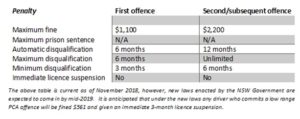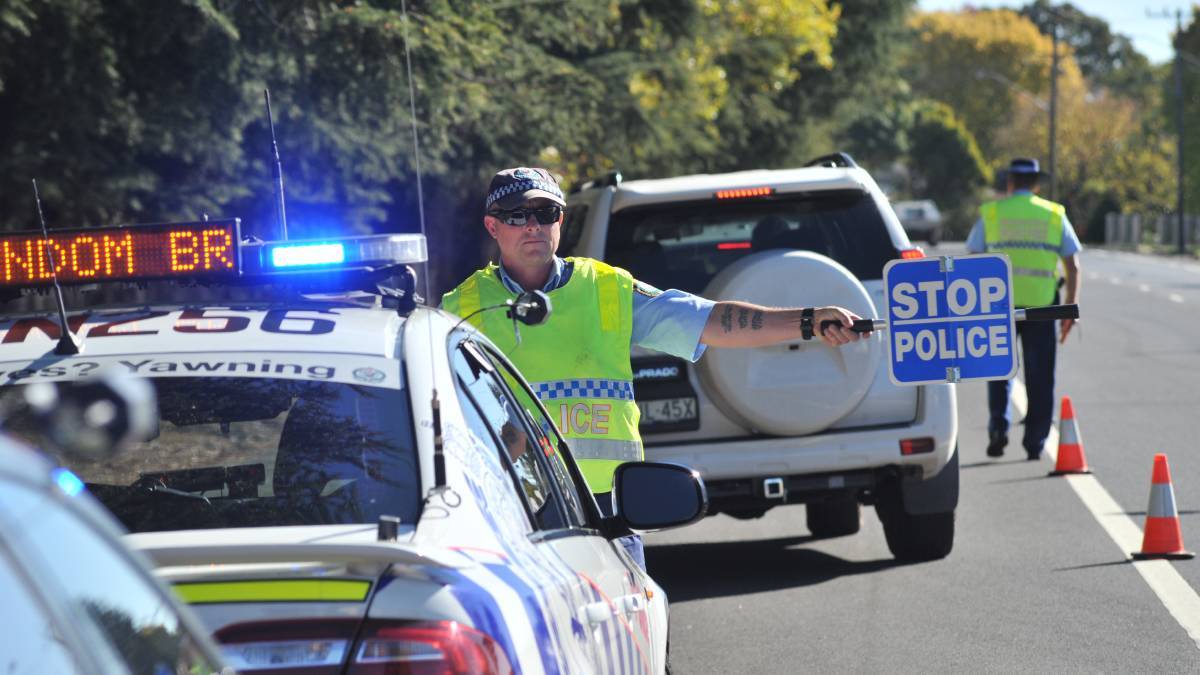The Offence
The offence of low range drink driving is found in Section 110(3) of the Road Transport Act 2013 NSW:
A person must not, while there is present in the person’s breath or blood the low range prescribed concentration of alcohol:
(a) Drive a motor vehicle, or
(b) Occupy the driving seat of a motor vehicle and attempt to put the motor vehicle in motion, or
(c) If the person is the holder of an applicable driver licence (other than an applicable provisional licence or applicable learner licence)–occupy the seat in a motor vehicle next to a learner driver who is driving the vehicle.
A Low range prescribed concentration of alcohol is a blood alcohol concentration of 0.05 to 0.079.
What is the maximum penalty?

First Offence
The maximum penalty for a first-time offender is an $1100 fine and an automatic licence disqualification of 6 months. However a court does have the discretion to reduce the fine and importantly the period of disqualification. However a court cannot reduce the disqualification period less than 3 months as that is the minimum disqualification period a court can impose for a first time offender, unless the court is persuaded not to record a conviction. If the court does not record a conviction than no disqualification period or fine will apply.
Second or subsequent offence
For a second/subsequent offence committed, a driver can expect an automatic 12-month licence disqualification and a maximum fine of $2,200. The court has the discretion to vary both the amount of the fine and period of disqualification (not less than 6 months). The court can also choose not to record a conviction against a second or subsequent offender although this is less likely to occur when compared to a first offence.
What is a second or subsequent offence?
A second or subsequent offence is committed where the offender in the previous 5 years has been convicted of a “major offence”. Therefore a second or subsequent offence is not limited to only a second drink driving offence but any “major offence” as defined by the Road Transport Act. Click here to find out more about major traffic offences.
Can I avoid a criminal conviction for a low range drink driving offence?
In certain circumstance the court may be persuaded not to record a conviction for a low range drink driving offence which would mean that the offender does not receive a penalty or licence disqualification. The most common sentence a court would impose in a low range drink driving matter where a conviction is not recorded is a conditional release order without conviction (formerly known as a Section 10 good behaviour bond). A conditional release order without a conviction means that despite the Court finding the driver guilty of low range drink driving, the Court will discharge the person without recording a conviction on their criminal record on the basis that the offender agrees to enter into a good behaviour bond for a specified period of time. There are various conditions which the Court can impose as part of a good behaviour bond and the offender will need to obey these conditions for the entire duration of the bond (the maximum length of a bond is 2 years). If the person breaches the good behaviour bond the court may revoke the good behaviour bond and re-sentence the offender to a harsher form of punishment.
What factors will the Court take into consideration in sentencing?
There are many factors, both objective and subjective, which will assist the Court in determining the most appropriate penalty to impose or whether to discharge the offender without a recording a conviction.
Objective seriousness
There are several factors which the Court may take into consideration when determining the objective seriousness of the offence. As few as one or all factors can be taken into consideration based on the circumstances of the case. Some common factors that are considered in all drink driving matters are:
The degree of intoxication
The higher the blood alcohol concentration the more serious the court will consider the offence to be. For example, an offence regarding a blood alcohol concentration of 0.079 is considered to be more serious than an offence where the blood alcohol concentration is 0.051.
The number of people put at risk by the offender’s driving
This is considered in a number of ways:
The nature of the driving – reason(s) why the driver was pulled over
The circumstances under which the driver came to police attention is important. If police stopped the driver because of the nature of his or her driving, this would generally be considered an aggravating factor as opposed to a driver who was pulled over for a random breath test.
Length of the intended journey
A trivial or short distance of travel will suggest to the Court that fewer people were at risk of death or injury in comparison to a long distance journey.
Number of passengers in the vehicle
The fewer passengers present in the vehicle the less serious the offence will be considered as there can be said to be fewer people at risk of death or injury.
Time of the incident and the traffic condition at the time
The time of day/night and the traffic conditions are also relevant. If the incident has occurred at a time of day/night where there are fewer cars on the road or in an area with minor/limited traffic, there can be said to have been fewer people at risk of death or injury.
Reason(s) for driving
The Court will also consider the reason for why the offender was driving. Offences where the driving occurs out of necessity or emergency are considered to be less serious than offences where the offender was driving simply out of convenience.
Observations regarding the impact of alcohol
Police will commonly detail their observations of the offender at the time of the offence and whether the offender seemed to be affected by alcohol. If police make observations to suggest that the offender was visibly affected by alcohol (i.e. slurring of words, diminished balance, aggression) the court may take this into account as an aggravating factors.
Subjective Considerations
The court can also consider the subjective circumstances of an offender in determining an appropriate sentence. Some common considerations in low range drink driving offences include:
The need for a drivers licence (employment/family)
The nature of an offender’s employment is one of the more significant factors for the court’s consideration when determining whether or not to convict the offender or alternatively when determining the length of the disqualification period to impose. Superior courts have held that “Licence disqualification is such a significant matter and can have such a devastating affect on a person’s ability to derive income and to function appropriately within the community that it is a matter which must be taken into account by a court when determining what the consequences should be.”
Prior good character
A person who is otherwise of good character is more likely to receive leniency from the court. An offender’s character is usually considered in light of their traffic and criminal history.
Traffic history and criminal record
A person’s traffic history and criminal record are very important factors that the court takes into account when determining the appropriate penalty to impose for a low range drink driving offence. A person with a lengthy traffic history and/or lengthy criminal history is less likely to receive leniency from the court.
Rehabilitation undertaken
Traffic Offenders Rehabilitation Program
The Traffic Offenders Rehabilitation Program (TORP) is the most common form of rehabilitation for low range drink driving offences. The program covers a variety of driving behaviours and allows participants to see the impact of their offending from a number of different of perspectives. The cost of the course is usually around $200 and can be done in two days or 6 weeks depending on the provider. The most common providers of the program are:
Alcohol rehabilitation
Offenders can also voluntarily engage in alcohol rehabilitation, particularly where the offending is related to alcohol abuse. Dealing with the underlying problem may resolve the offending behaviour and that is a factor which the court can take into account. Alcohol rehabilitation can be accessed through a number of different mediums including a general practitioner or alternatively through programs such as Alcoholics Anonymous.
The Sober Driver Program
The sober driver program is a 20 hour program which helps change the attitudes and behaviours of repeat and high risk offenders. Participants must be referred to the program by a magistrate, a community corrections officer or by a letter from the RMS.
Age of offender
The age of the offender is also a relevant factor in determining an appropriate sentence. Generally speaking older and more mature drivers are held to a higher standard because they are expected to know better.
Remorse, contrition, and insight
The court will also take into account any remorse, contrition and insight the offender has shown. In low range drink driving offences this is usually evidenced through a letter of apology and character references.
Early plea of guilty
Pleading guilty at an early opportunity shows a readiness on the offender’s part to accept accountability for their actions and can also be evidence of remorse and contrition. The law requires the court to extend to the offender a discount of up to 25% on the sentence they would have otherwise received had they not plead guilty.
What do I need to prepare for my sentence?
Obtain character references
Detailed character references written by friends, family members and work colleagues can give the court a better picture about the subjective circumstances of the offender. The referees can express to the Court that the offender’s actions were out of character and were an isolated incident and importantly they can detail the insight, remorse and regret that the offender has shown. Further and most importantly the references can detail the offenders need for a driver’s licence particularly in the case of employment.
Write a letter of apology
A letter of apology can convey an offender’s genuine remorse, regret and embarrassment at being charged with a low range drink driving offence. It can also be an appropriate medium to detail the reason for the offending and the reason for why the offender was driving at the time. An apology letter is also an effective way of detailing the offender’s subjective circumstances.
Undertake rehabilitation
Whether it is attending the Traffic Offenders Rehabilitation Program or seeing a psychologist it is important to show the Court that the offender has received some rehabilitation and therefore as a result the likelihood of re-offending has diminished
Why should I choose Australian Criminal and Family Lawyers?
Our highly experienced traffic lawyers are experts at dealing with low range drink driving offences. We appreciate how important it is for our client’s to avoid the burden of a criminal conviction and importantly the debilitating impact a loss of licence may have. Our familiarity and knowledge of the laws and authorities are second to none which means that you can rest assured that you are getting Sydney’s best traffic lawyers on your side.
Our lawyers are ready to take calls 24 hours, 7 days a week. Call us now on 1300SILENT (1300-745-368) or alternatively 0448 142 113 to get immediate legal advice.



